Orson Welles’s The Trial (1962): Criterion Blu-ray review
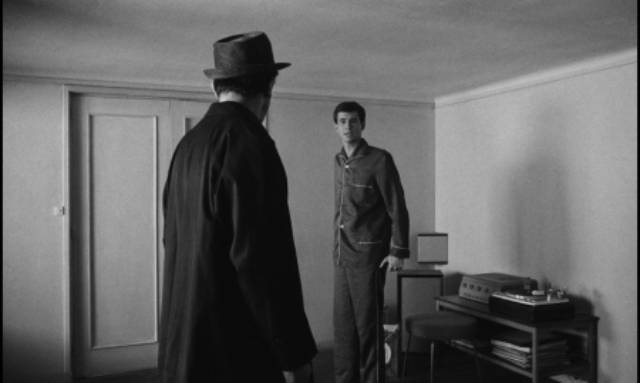
How do you make a film in which every image has a tactile, material quality which evokes an oppressive physical reality, while every incident, every character remains virtually unknowable? The tension between crushing physicality and an equally crushing sense of uncertainty and anxiety is sustained without relief by Orson Welles in his adaptation of Franz Kafka’s unfinished novel The Trial (published posthumously in 1925), a film which embodies the paranoia at the heart of totalitarianism. Written in the wake of the First World War, the book looks ahead to the monstrous regimes of Stalin and Hitler and their techniques for enforcing submission in the populations which lived under them.
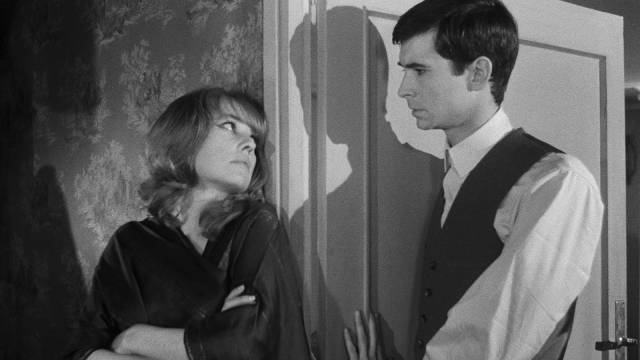
At the centre of those techniques were bureaucracies adept in gaslighting people, who could never be sure of all the rules and their endless nuances, never sure of whether they might be committing some transgression whose consequences could range anywhere from a reprimand to death. For Josef K. (Anthony Perkins) it begins at 6:14 one morning when a strange man walks into his bedroom. This man (Arnoldo Foà) conveys little information, instead allowing his vaguely threatening presence to prompt nervous chatter from K., who intuits that he’s a policeman. This inspector and his subordinates (Billy Kearns and Jess Hahn) poke around K.’s room and the bedroom next door, making note of everything the nervous tenant says, seemingly reading meaning into every non sequitur and verbal slip (he inadvertently says “pornograph” instead of “phonograph”).
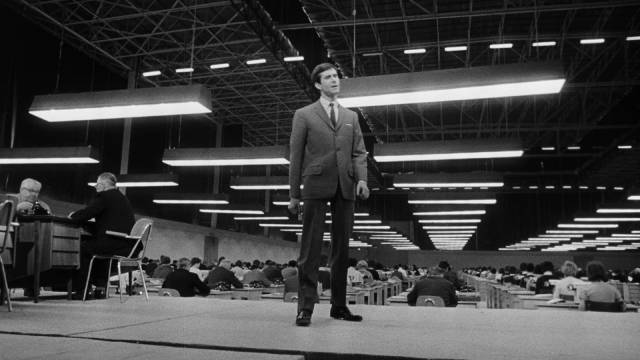
Eventually, K. is told that he’s under arrest, though this won’t interfere with his normal routine – he can still go to work as usual. And this begins his frustrating quest to discover what crime he has supposedly committed, which is necessary before he can formulate any defence. The insidious methods of the state force him to internalize the entire process because he is never given any information which might allow him to orient himself. The whole purpose is to instill a sense of guilt and induce an acceptance of punishment, without ever specifying what it is he is guilty of.
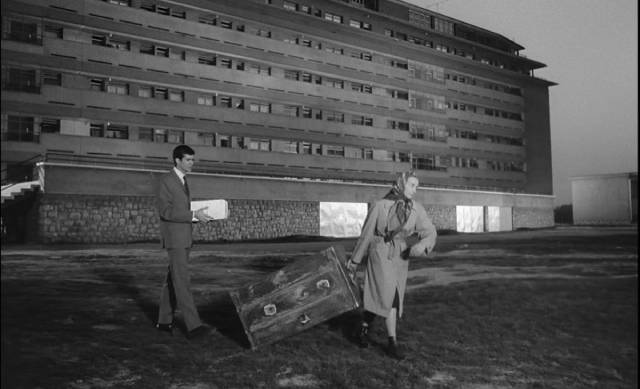
The Trial (1962) is the one film Welles made which isn’t set in a recognizably real time and place (well, perhaps the expressionistic sets of Macbeth [1948] might qualify, though that could be viewed more as a filmed theatrical production); one of its most remarkable qualities is the way he uses existing locations to create a nightmarish world which becomes increasingly conceptual, reflecting K.’s escalating paranoia and desperation, with doors opening from one space into a completely different space, as if the world is collapsing in on itself, becoming an inescapable labyrinth.
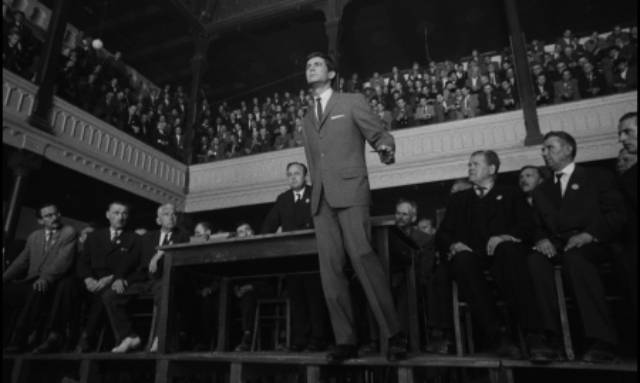
Much of it was shot in the derelict Gare d’Orsay railway station in Paris, a vast, ornate structure of steel and concrete, littered with the detritus of decades as a major centre of transportation now abandoned (before being reinvented as an art museum). Winding corridors, the residence of the Advocate (Welles himself) piled high with files and discarded paintings, even the vast hall filled with hundreds of clerks typing away at rows of desks over which K. watches from his station on a raised platform – they were all found in the old terminus after Welles was told by producer Alexander Salkind that there was no money to build sets.
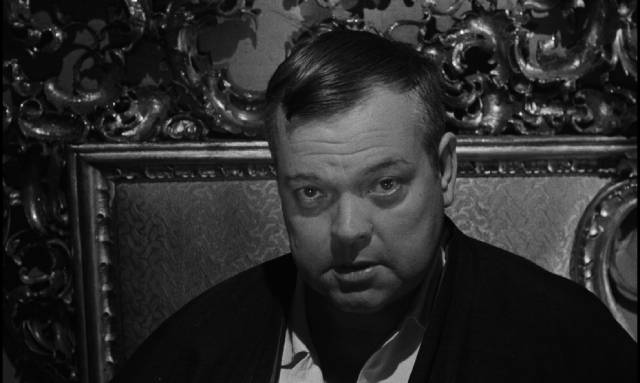
Exteriors were filmed in Paris, Rome and Zagreb, the latter providing one of the film’s most striking long takes. This is a tracking shot across a muddy waste ground in front of grim brutalist apartment blocks, with K. following a limping woman (Suzanne Flon) dragging a heavy trunk belonging to his erstwhile neighbour Miss Burstner (Jeanne Moreau) who has been evicted in part as a consequence of the police visit to him that morning. This is just one of the distinctively Wellesian visual moments in the film. The police visit itself, mostly played in a single uninterrupted take in K.’s cramped room (the set has a deliberately low ceiling which seems to press down on the characters); K. walking against the hundreds of clerks in the vast office at quitting time; and in contrast, dynamic sequences of rapid montage with each shot in motion, the combined movement and cutting instilling a sense of relentless energy sweeping K. along under the control of external forces.
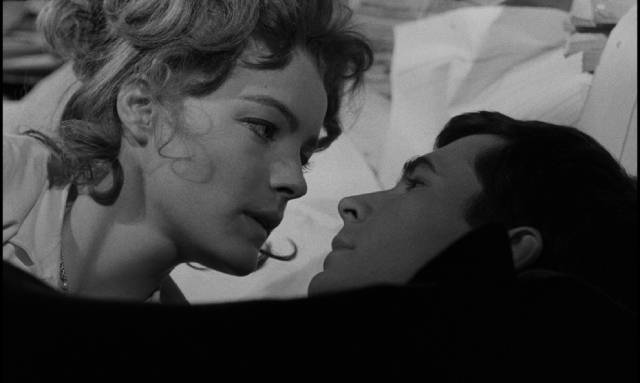
While there were moments of monumentalism in Welles’s work from the beginning – the great hall of Xanadu in Citizen Kane (1941) – here the architecture dwarfs the characters at every turn, whether trapped in those labyrinthine interiors or overwhelmed by massive steel and stone structures which embody the authoritarian state against which the individual is powerless. There are echoes of Lang’s Metropolis (1926), but also it seems of Jacques Tati’s Paris in Playtime (1968), although the tone and use to which the city is put in that masterpiece is very different: Tati’s film reclaims a human scale against the anti-human urban modernism, but in The Trial that reclamation is impossible. Rather than a disparate group of people coming together to reassert their shared communal power, the people who inhabit Welles’s world are broken and remain separate in their individual desperation.
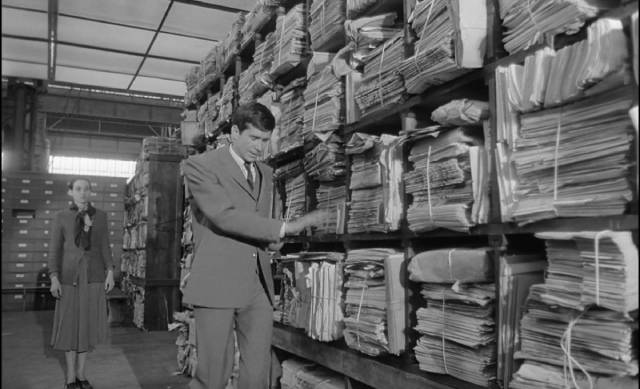
Made between Touch of Evil (1958) and Chimes at Midnight (1965), The Trial is yet another project which gives the lie to Welles’s reputation as a failure – how many filmmakers have three films in a row which can compare? Although Touch of Evil was taken from him and re-edited by Universal, sending Welles back into his European exile, The Trial was one of the few films on which he was entirely free to work without interference; even if he was beset by budgetary issues thanks to the unreliable Alexander Salkind (who would go on to greater commercial success with the Superman franchise [1978-83] and Richard Lester’s The Three Musketeers [1973] and The Four Musketeers [1974]), there was no creative interference. As such, like Kane and Chimes at Midnight, it’s an exhilarating display of Welles’s passion and instincts as a filmmaker; despite the disdain in which he was held by Hollywood, few had his visual sense, his skill with camera movement and editing, and as an actor himself, he was generous and sensitive to his casts.
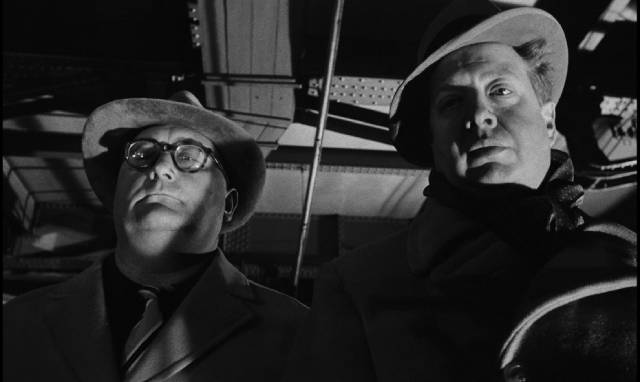
The Trial is full of wonderful, expressive performances, with every supporting player allowed the space to make something even of the smallest role. Foà is brilliantly deadpan as the police inspector; Akim Tamiroff pathetic as another of the Advocate’s desperate clients; and as the three women who seem stimulated by K.’s precarious situation, Jeanne Moreau as his neighbour, Romy Schneider as the Advocate’s nurse and Elsa Martinelli as the wife of the courtroom guard add an erotic charge which repeatedly destabilizes K. while he navigates the increasingly baroque and confusing legal process.
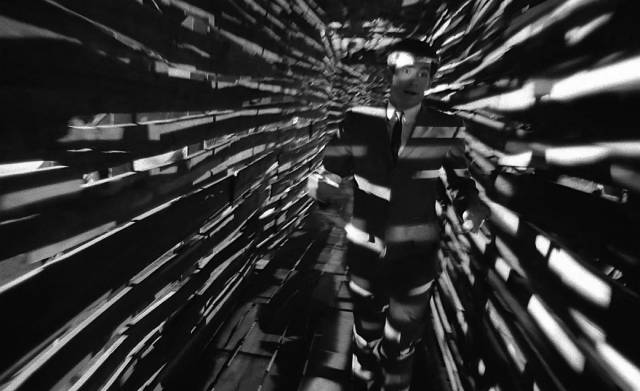
Welles himself embodies the opaque system, using its very impenetrability to exert power over his clients and humiliate them, while Anthony Perkins, quite fresh from his jittery Norman Bates, conveys an interesting mix of smug self-assurance and deep insecurity, at different moments being over-assertive in his disdain for what he sees as a corrupt and illegitimate process or almost childlike in his confusion and helplessness. As the system gradually grinds him down, he becomes increasingly uncertain of his own innocence, even though he never does learn what it is that he has supposedly done. Welles himself deemed K. guilty because he was a petty bureaucrat striving to get ahead in the same oppressive system which eventually turns against him.
*
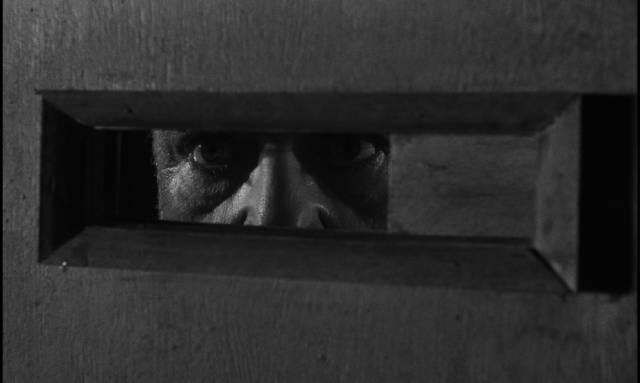
The disk
Criterion’s new release – in a dual-format edition as well as a stand-alone Blu-ray – is mastered from a 4K restoration by StudioCanal and the Cinematheque francaise, and it looks gorgeous. The cinematography by Edmond Richard (remarkably, his first feature) captures the distinctive atmosphere of the sets and locations with great sensitivity, becoming darker and more oppressive as the story unfolds, with numerous complex yet unobtrusive moves throughout. Richard went on to shoot Chimes at Midnight, Welles’s unfinished Don Quixote and Luis Bunuel’s final three features.
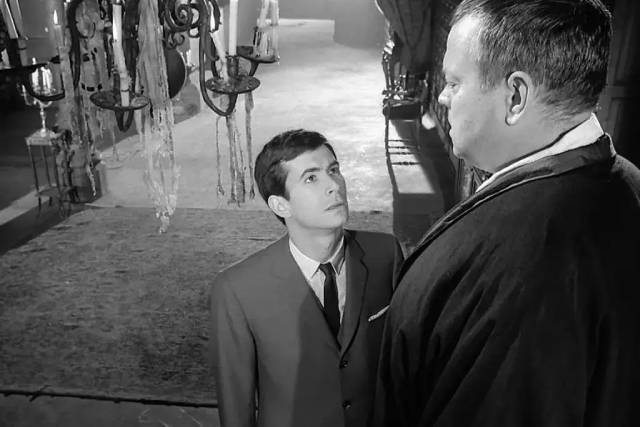
The supplements
The feature is supported by some substantial supplements, beginning with a commentary by film historian Joseph McBride, who has written three books on Welles and had personal experience with the filmmaker from his time as a cast member in The Other Side of the Wind (shot in the early ’70s, but unfinished until 2018). McBride mixes personal reminiscences with details about the production and a critical evaluation of the film.
Welles himself talks about the production (and a wide range of other issues) in a Q&A shot by Gary Graver after a screening at USC in 1981 (1:23:38). This was intended to form the basis of one of Welles’s essay films about his work along the lines of Filming “Othello” (1978), but exists only as the raw footage, though that in itself is engaging and frequently illuminating about Welles’s own attitudes towards his career in general and what he accomplished with this Kafka adaptation in particular.
Cinematographer Edmond Richard reminisces about the production, working with Welles and the technical challenges posed by the film in an archival interview (23:10) and Welles and Moreau chat over dinner at the Ritz in a piece made for French television in 1972 (29:00), in which both are relaxed and engaging as they talk about their previous work together and possible future projects.
There’s also a brief restoration trailer (1:02) and a booklet essay by novelist Jonathan Lethem.
Comments